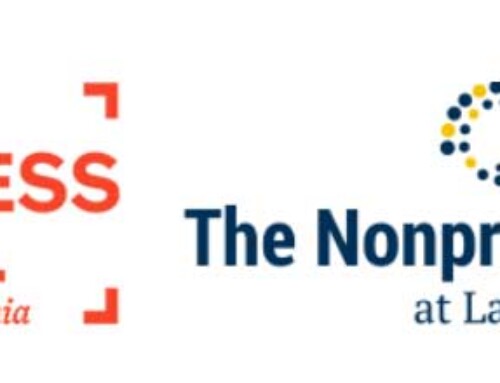On Thursday, September 24, 2020, the Arts + Business Council held our first-ever virtual Defining Innovation. We were joined by Whole Foods Market Co-Founder and CEO John Mackey, also the Co-Founder of Conscious Capitalism, Inc., a nonprofit supporting a global community of leaders dedicated to elevating humanity through business.
To kick off an insightful conversation on conscious leadership, Mackey was joined by Mike Dershowitz, Founder and CEO of Fair Trade Outsourcing, a Philadelphia-based outsourcing center with a mission to reduce global poverty and economic insecurity.
In the midst of an economic and global crisis, Mackey and Dershowitz discussed how businesses can continue to be conscious of their stakeholders while, at the same time, they are focused on their survival. Mackey shared three key pieces of advice.
The answer is not either-or, but both: profit and purpose.
For Mackey, the answer to creating a purpose-driven, sustainable business model has always been to prioritize both profit and people, stressing that to navigate difficult times, businesses must learn to do both.
Lead with love; always act with integrity.
Recalling chapters he’d read from part one of Mackey’s newly released book, Conscious Leadership: Elevating Humanity through Business, Dershowitz asked Mackey to elaborate on what it means to be a good person and how that translates into being a good leader.
Mackey responded with his personal mantra: “Lead with love; always act with integrity.” He explained how love and integrity can be built step-by-step, helping leaders implement them over time. He encouraged small actions that translate into a business setting and fall under the overarching themes of both traits:
Love
Generosity
Gratitude
Appreciation
Care
Compassion
Forgiveness
Integrity
Truth-telling
Honor
Authenticity
Courage
Trustworthiness
These are skills we develop, according to Mackey, adding that humans are naturally loving beings towards our families and friends but face more difficulty leading with love in corporate settings: “To lead with love, we have to develop that… through practice.”
Look for win-win-win solutions.
From Mackey’s perspective, conscious leadership is not about making corporations or business people less greedy. To him, business is inherently good, but he argues, “We can make it better if we do the stakeholder thing more consciously. We can’t think about it as a trade-off.”
To leaders in the virtual room, Mackey urges them to find “win-win-win solutions.” When he is in business meetings to discuss potential partnerships, Mackey notes that he makes certain the deal is good for his business, good for his potential partner, and good for the larger society.
Citing Whole Foods Market’s recent merger with Amazon, Mackey notes it was a good deal for the organic grocery store chain’s stakeholders in that the company was able to implement a series of price cuts for its customers, good for Whole Foods Market in that Amazon’s technological prowess allowed the company to build strong delivery services, good for Amazon in that they gained access to a new market, and overall good for Whole Foods Market’s investors, communities, foundations, and more.
Mackey was then joined by a panel of local leaders to form our Strategy Salon comprised of Brigitte Daniel Cohen, Executive Vice President of Wilco Electronics Systems; Suzie Turner, Chief Human Resources Officer of CapTech Consulting, and our moderator Peter Madden, CEO of AgileCat.
Asking the panel to give an example of the win-win-win mindset, Madden pointed the remaining conversations back to Mackey’s key advice. Cohen offered a perfect summation of the course 2020 has set many of us on, in our personal lives and in business:
“What 2020 represents is a cultural shift, a shift in wealth, a shift in health, a shift in everything that we probably hadn’t really ever imagined up until this time in the most contemporary and dramatic way. The basis of [the shift] is around inequities around inclusion; the pandemic is really showing and unearthing a lot of disparities in every type of sector that you can think of, but there are opportunities to grind in and do better.”
Because Philadelphia is a city comprised of predominantly racial minorities, Cohen, who was honored as a RealLIST Connector by Technical.ly Philly for her push for inclusion in the tech industry, argues “If we’re not looking at inclusion as a strategic goal, a return on investment but also return in communities,” then the business community is failing to see the value in communities that make up over half of the racial demographic of our city, adding that inclusion “has to be something that becomes more ingrained, not just a feel-good, but a market-good. … Inclusivity has to start from leadership, it has start from corporations that are leading, our anchor corporations, so that others will follow… will be emboldened and inspired to grow.”
At CapTech Consulting, Turner offered insight into how she helps to create a win-win-win cultural mindset internally at the company. Instead of fostering a culture of competition, Captech encourages the the opposite. They look for employees that are passionate about building those around them and caring for a team, open to learning how to lead with “heart,” and willing to take their egos out of the equation.
Drawing on the design thinking skillset, she also has her team take part in “innovation challenges” in which they form teams, prototype, and present to a leadership panel their solutions to issues like accessibility, wearable-tech, and more, to keep employees focused on how to collaborate as a team to help their clients and the broader community.













Leave A Comment